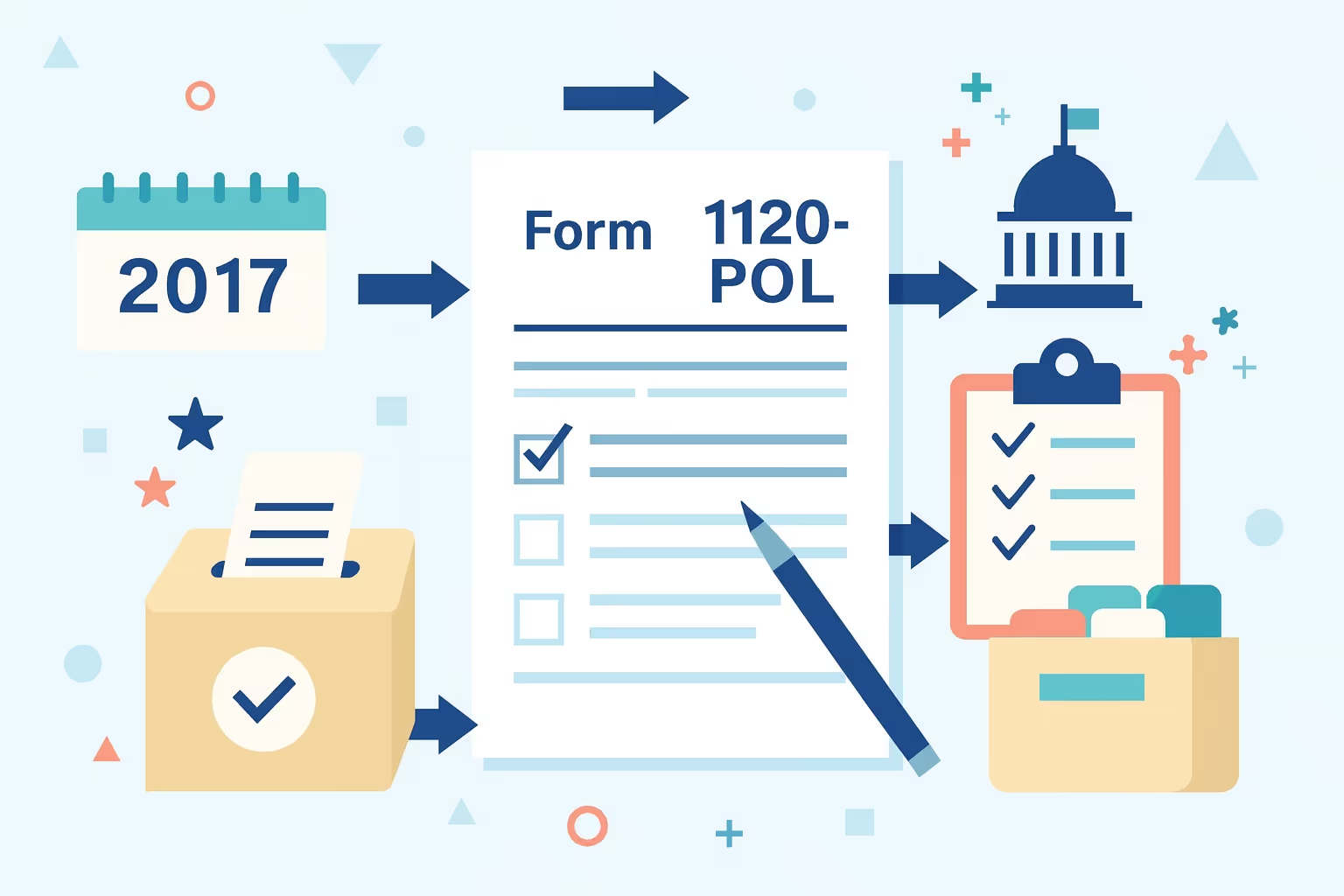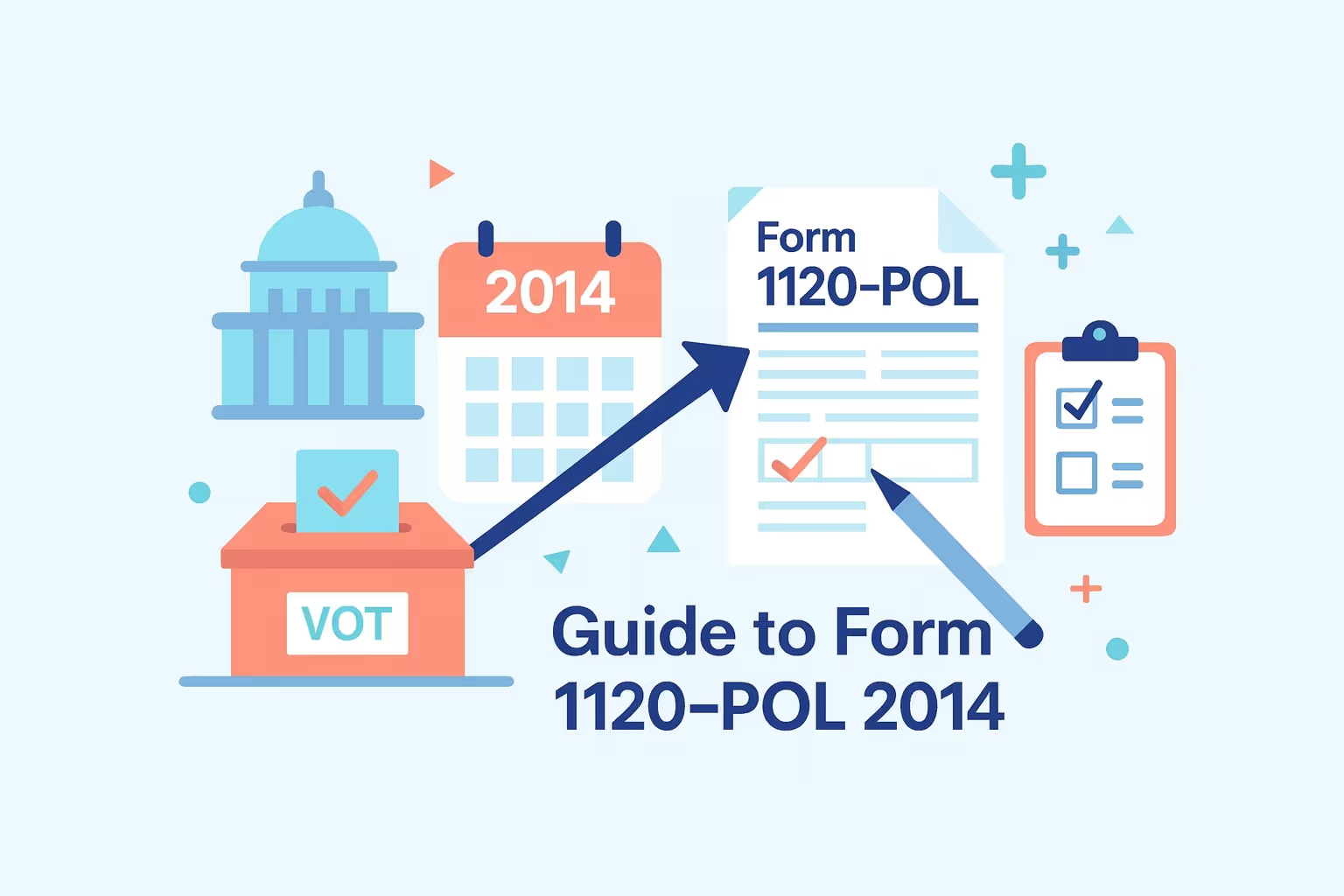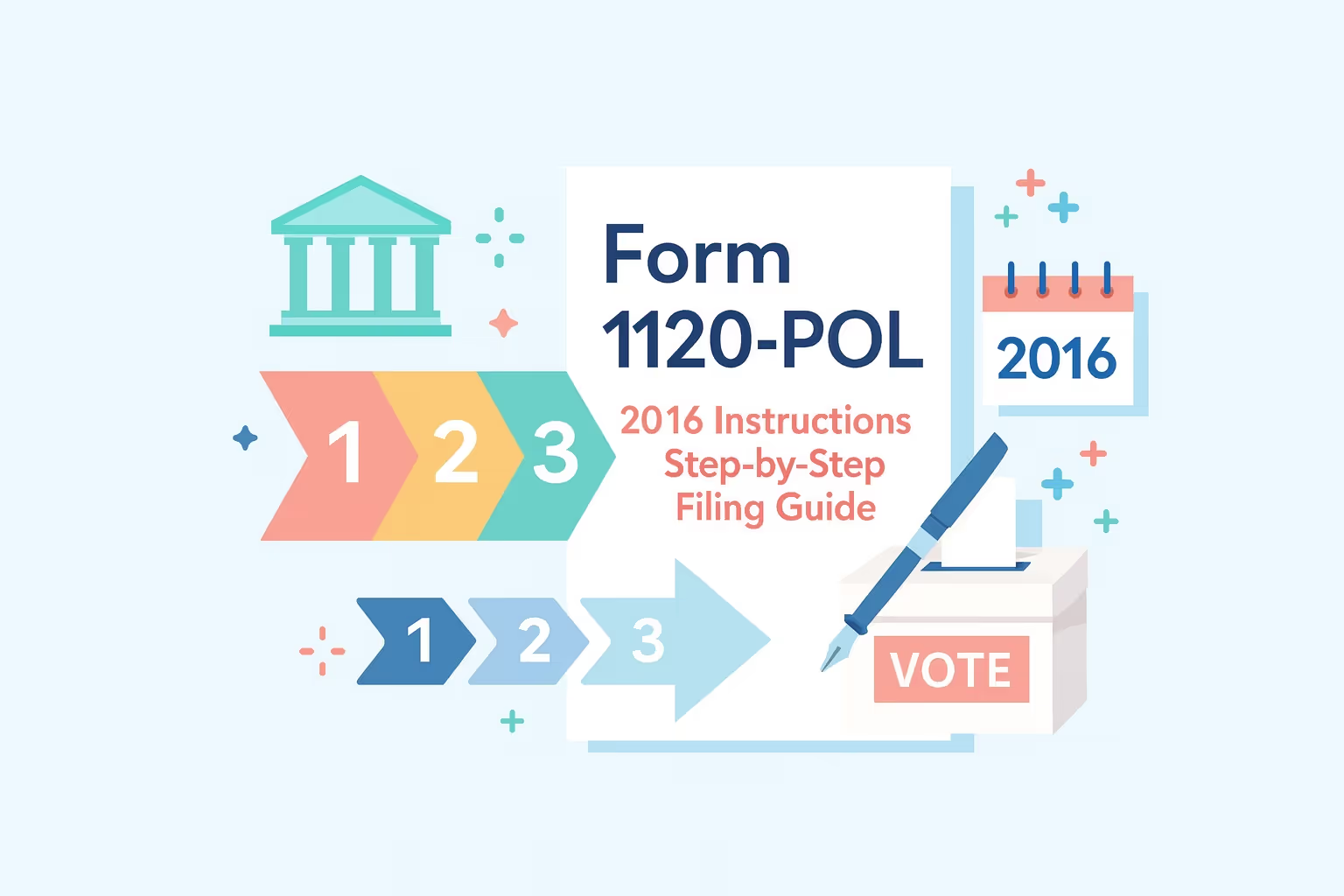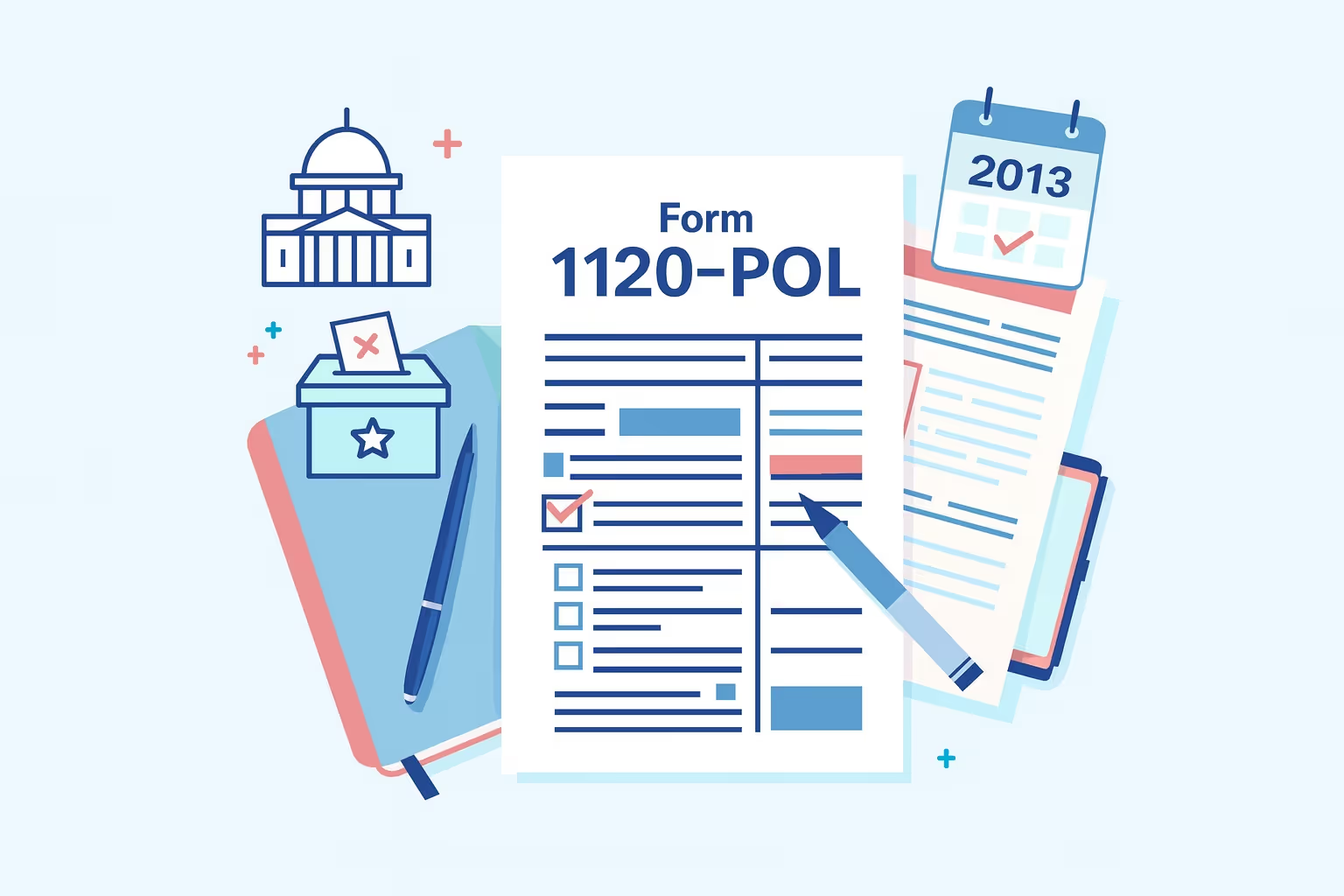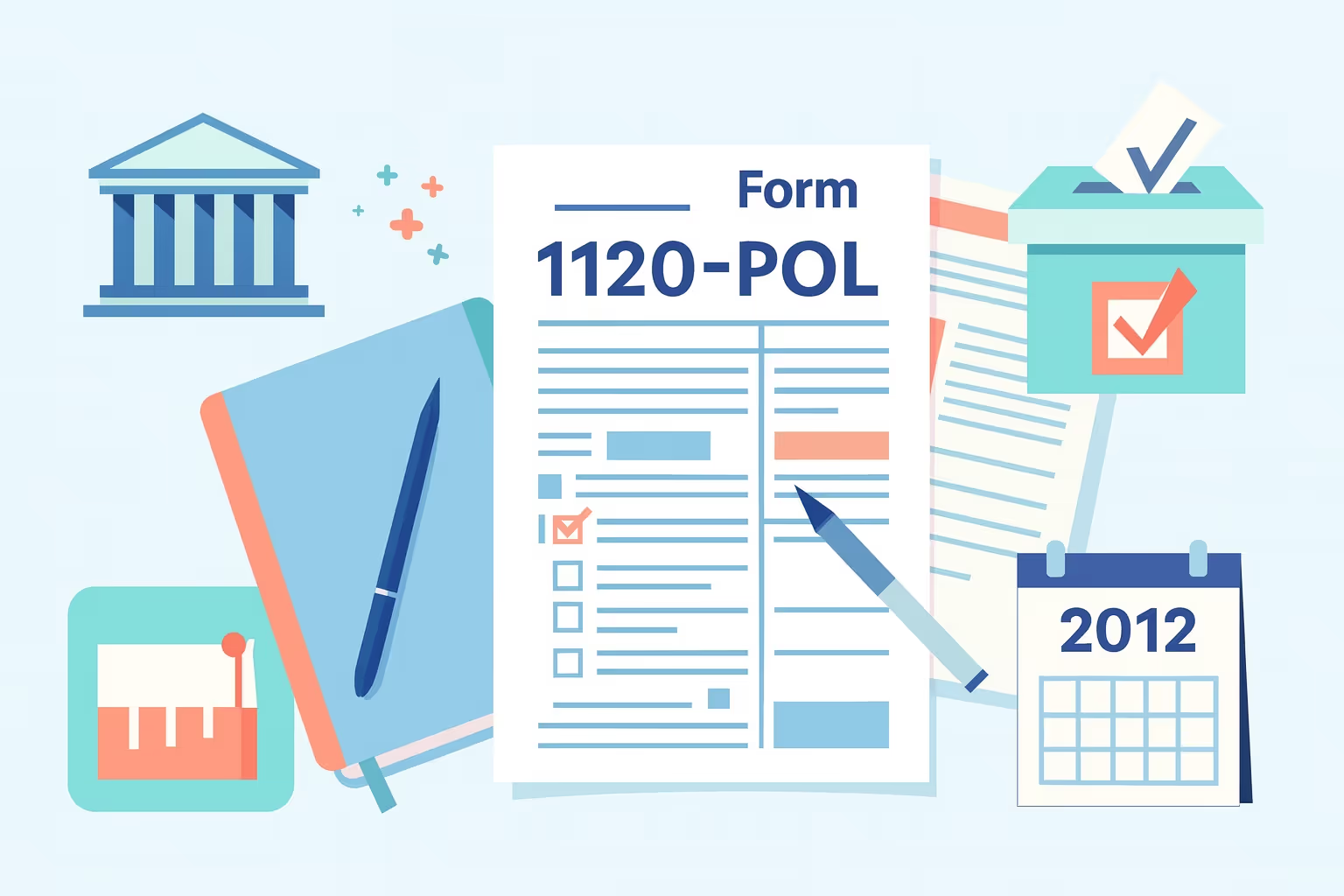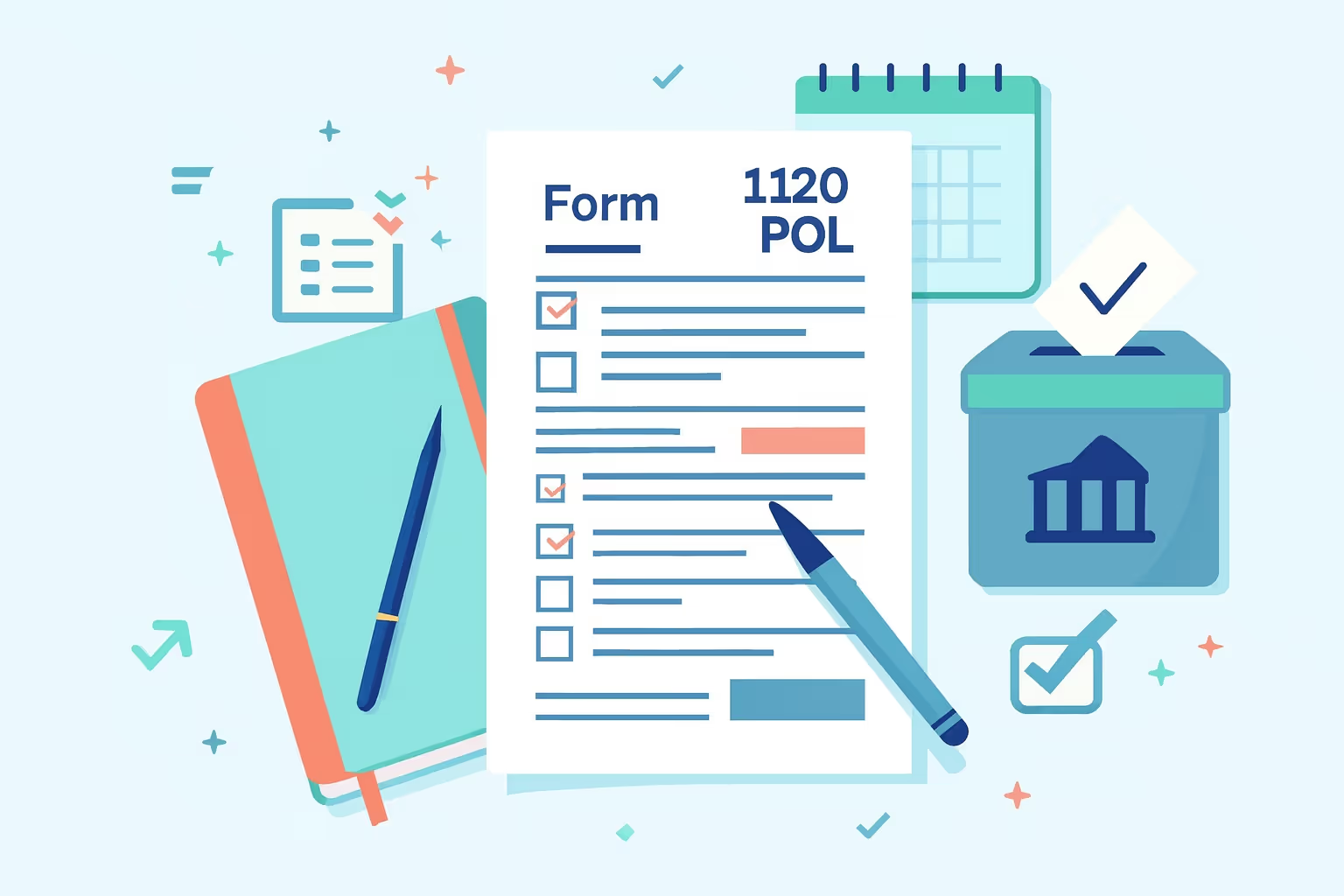
Filing taxes for a political organization can seem complicated, especially involving IRS Form 1120-POL. This form, officially titled U.S. Income Tax Return for Certain Political Organizations, is required when a political party, committee, or fund earns taxable income. It helps the IRS determine how much income tax is owed under the Internal Revenue Code. Whether your group is a large political committee or a smaller fund established to support a state or local candidate, understanding this form is essential for maintaining compliance and protecting your organization’s tax-exempt status.
Political organizations are generally exempt from federal income tax when their earnings come from exempt functions, such as campaign contributions or fundraising for political activities. However, if an organization earns net investment income or revenue from business activities unrelated to its exempt function, it may owe tax. Filing Form 1120-POL is mandatory when a political organization's taxable income exceeds $100 in a calendar year. Even when the total amount is below that threshold, submitting the return is often recommended to establish a compliance record with federal law.
This guide offers clear, step-by-step Form 1120-POL 2021 instructions for beginners. You’ll learn to identify who must file, gather required information, complete each section accurately, and submit your return on time. We’ll also explain how the rules apply to tax-exempt organizations, political committees, and separate segregated funds, along with tips to avoid common errors. By following this structured approach, your organization can meet IRS reporting requirements confidently and stay in good standing under federal election and tax laws.
Understanding IRS Form 1120-POL
Form 1120-POL, titled U.S. Income Tax Return for Certain Political Organizations, reports taxable income earned outside a group’s tax-exempt purpose. It helps the IRS determine how much federal income tax applies to non-exempt income.
The form covers entities under Section 527 of the Internal Revenue Code, including political parties, committees, and funds. While campaign contributions or fundraising income are generally exempt, unrelated earnings—such as investments or rentals—are taxable and must be reported accurately. You can review the IRS’s detailed overview at IRS Form 1120-POL.
Who Needs to File Form 1120-POL
The IRS requires certain organizations to file this form when specific income thresholds are met:
- Required Filers: Political parties, campaign committees, and separate segregated funds must file Form 1120-POL if they earn political organization taxable income exceeding $100 during the calendar year.
- Section 501(c) Organizations: Tax-exempt organizations that earn income from activities unrelated to their exempt purpose must also file if taxable under Section 527(f)(1).
- Optional Filers: Filing is often recommended even if an organization earns $100 or less taxable income. Doing so starts the statute of limitations period, demonstrates compliance with federal law, and builds a transparent tax record.
Key Tax Concepts to Understand
Understanding the difference between taxable and exempt income ensures accurate reporting:
- Taxable Income: This includes investment income such as interest, dividends, capital gains, rents, or any business income not tied to exempt political purposes. These funds are subject to federal income tax.
- Exempt Function Income: This covers money raised through contributions, membership dues, or fundraising events that support political activities or campaigns. When used appropriately for the organization’s exempt purpose, these funds are excluded from taxation.
Maintaining clear accounting records for both categories is essential. Proper documentation helps safeguard a political organization’s tax-exempt status, reduces the risk of IRS penalties, and ensures compliance with federal reporting requirements.
What’s New for the 2021 Tax Year
Several updates and clarifications were introduced for political organizations filing Form 1120-POL in 2021. The most notable changes include the following:
- Section 965(a) Inclusion Amounts: These amounts no longer apply to most filers. However, organizations still making installments based on a prior Section 965(a) election must continue to attach Form 965-B to their return.
- Flat 21% Federal Tax Rate: The corporate tax rate remains a flat 21% for political organizations, and the alternative minimum tax continues not to apply to them.
- Electronic Filing (Modernized e-File): The IRS maintained access to electronic filing through its Modernized e-File (MeF) system, and approved tax software providers continue to support e-filing for this form.
- Electronic Payment and Deposit Requirements: Political organizations must make all federal tax deposits and payments electronically. This rule helps ensure accuracy and faster processing.
- Reference Resource: Review the official 2021 Form 1120-POL PDF provided by the IRS for a detailed overview of updates and filing instructions.
These updates reflect the IRS’s ongoing effort to simplify compliance and improve reporting transparency for specific political organizations under federal tax law.
Preparing to File Form 1120-POL
Filing Form 1120-POL begins with gathering accurate records and confirming that your organization meets the IRS filing requirements. Careful preparation helps avoid mistakes, delays, and potential penalties. The following steps outline what every political organization should do before starting its income tax return.
Information and Documents You’ll Need
Before completing the form, collect the following details and supporting records:
- Organization Information: Include your legal name, address, and Employer Identification Number (EIN). Verify that all information matches what the IRS has on file.
- Financial Statements: Gather documentation for all income and expenses, including bank statements, investment reports, and receipts related to political or business activities.
- Prior Year Tax Returns: Review previous Form 1120-POL filings or other annual information returns to ensure consistency in your organization’s reporting.
- Form 8871 Filing Proof: Confirm that your organization has filed Form 8871, which notifies the IRS of your tax-exempt status. Failure to maintain this filing can make all income, including contributions, taxable.
- Records of Exempt and Non-Exempt Income: Maintain clear segregation between political (exempt function) income and taxable income, such as interest, dividends, or rental payments.
Determining Your Filing Requirement
You must file Form 1120-POL if your organization’s political organization taxable income exceeds $100 for the calendar year. This threshold applies to political committees, parties, and separate segregated funds established under the Federal Election Campaign Act.
Filing is encouraged even if your taxable income is $100 or less. Submitting a return starts the statute of limitations period, provides a compliance record under federal law, and demonstrates transparency in financial activities. Organizations operating on a calendar or fiscal year should verify their reporting period to ensure timely filing.
Step-by-Step Form 1120-POL Instructions
Completing the Form Header
- Enter the organization’s legal name and complete mailing address, which is exactly as registered with the IRS. This ensures your income tax return matches agency records.
- Provide the Employer Identification Number (EIN). Verify the EIN against prior filings to avoid processing delays.
- Check the applicable boxes (final, amended, name change, or address change). Use these boxes only when the status truly changed.
- Specify the tax year (calendar or fiscal). Confirm that financial statements reflect the same period.
Reporting Income (Lines 1–8)
- Line 1—Dividends: Report all dividends from stocks and mutual funds. Attach a statement listing each payer and amount.
- Line 2 – Interest: Include taxable interest from bank accounts, bonds, and loans. Keep backup statements that show accrual and receipt dates.
- Line 3 – Gross Rents: Report rental income from property leased to others. Do not net expenses here; deductions appear later.
- Line 4 – Gross Royalties: Enter royalty income from copyrights, patents, or natural resources. Maintain contracts supporting each stream.
- Line 5 – Capital Gains: Use Schedule D (Form 1120) to compute net capital gains. Transfer the net amount to this line.
- Line 6 – Form 4797 Gains: Report gains from sales of business property. Attach Form 4797 if applicable to your political organization.
- Line 7 – Other Income: Include amounts not properly segregated for exempt function use, business income from unrelated political activity, and income taxable due to Form 8871 issues. Provide a detailed statement that explains each source.
- Line 8 – Total Income: Add Lines 1–7. Confirm the total aligns with your general ledger.
Listing Deductions (Lines 9–16)
- Line 9 – Salaries and Wages: Deduct only compensation directly connected to producing taxable income. Exclude campaign staff costs.
- Line 10 – Repairs and Maintenance: Claim repairs for income-producing property. Capital improvements should be depreciated, not expensed.
- Line 11 – Rents: Deduct rent paid for property used to generate taxable investment or business income.
- Line 12 – Taxes and Licenses: Include property tax or license fees for taxable activities.
- Line 13 – Interest: Deduct interest on loans for taxable investments or business activities.
- Line 14 – Depreciation: Attach Form 4562 when required. Depreciable assets are used to produce taxable income under the Internal Revenue Code.
- Line 15 – Other Deductions: Provide a statement describing the expense, business purpose, and connection to taxable income.
- Line 16 – Total Deductions: Add Lines 9–15 and reconcile to your books.
Calculating Taxable Income and Tax (Lines 17–22)
- Line 17 – Taxable Income Before Specific Deduction: Subtract Line 16 from Line 8.
- Section 501(c) filers: Compute net investment income and limits under section 527(f)(1) and enter the smaller permitted amount.
- Section 501(c) filers: Compute net investment income and limits under section 527(f)(1) and enter the smaller permitted amount.
- Line 18 – Specific Deduction: Enter $100 (not allowed for newsletter funds). Ensure your facts support eligibility.
- Line 19 – Taxable Income: Subtract Line 18 from Line 17. Tax may not be due if zero or less, but filing may still be prudent.
- Line 20 – Income Tax: Multiply Line 19 by 21%. This flat corporate rate applies to specific political organizations.
- Line 21 – Credits: Claim allowable credits (for example, general business credit or foreign tax credit) using required forms. Retain calculations for each credit.
- Line 22 – Total Tax: Subtract credits from Line 20. Review computations for accuracy.
Reporting Payments and Refunds (Lines 23–25)
- Line 23 – Payments: Report extension payments with Form 7004, credits from Form 2439, and any fuel tax credits from Form 4136. Keep confirmation numbers for electronic payments.
- Line 24 – Tax Due: If Line 22 exceeds total payments, pay the balance electronically by the due date to avoid penalties.
- Line 25 – Overpayment: If payments exceed Line 22, request a refund or apply the amount to the following year. Document your choice in your records.
Tip: Tile each figure to a clear work paper trail throughout the form. Accurate schedules help exempt organizations and political parties demonstrate compliance and reduce audit exposure for transactions tied to investments and other non-exempt activities. This approach supports clean, consistent implementation of Form 1120-POL 2021 instructions across your filings.
Filing Methods for Form 1120-POL
Political organizations can choose between electronic filing (e-file) and paper filing, depending on their size, access to software, and filing preferences. While the IRS accepts both options, e-filing is recommended because it offers faster processing and fewer errors.
Electronic Filing (E-File)
Electronic filing is the most efficient and reliable way to submit Form 1120-POL. The IRS supports e-filing through its Modernized e-File (MeF) system, which ensures quick confirmation and reduces common data entry mistakes.
- Benefits of E-Filing:
- Faster processing and quicker acknowledgment of receipt.
- Built-in error checks that flag missing or invalid data before submission.
- Secure transmission of sensitive information and compliance with federal law data protection standards.
- Faster refunds or application of overpayments to future returns.
- Faster processing and quicker acknowledgment of receipt.
- How to E-File:
- Choose an IRS-approved e-file provider or authorized tax software that supports Form 1120-POL.
- Complete the form, attach required schedules (such as Schedule D or Form 4562), and digitally sign using the organization’s EIN.
- Submit the return electronically and retain the confirmation notice as part of your records.
- Choose an IRS-approved e-file provider or authorized tax software that supports Form 1120-POL.
Paper Filing Option
Although e-filing is preferred, specific political organizations may file a paper return if e-filing software is unavailable or if their returns require special handling.
- Mailing Addresses:
- U.S. Filers:
Department of the Treasury
Internal Revenue Service Center
Ogden, UT 84201 - Foreign Filers:
Internal Revenue Service Center
P.O. Box 409101
Ogden, UT 84409
- U.S. Filers:
- Checklist Before Mailing:
- Use blue or black ink and ensure the form is signed and dated by an authorized officer.
- Attach all schedules, statements, and supporting documentation.
- Include copies of Form 8871 or other required information for tax-exempt organizations.
- Mail using certified or tracked delivery to confirm receipt by the IRS.
- Use blue or black ink and ensure the form is signed and dated by an authorized officer.
Private Delivery Services
If mailing through private carriers, use only IRS-designated providers such as FedEx or UPS. These services cannot deliver to P.O. Boxes, so use the IRS street address listed on their website for courier submissions.
Choosing the correct filing method depends on your organization’s capabilities and preferences. However, e-filing is strongly encouraged, as it streamlines the submission process and ensures full compliance with Form 1120-POL 2021 instructions and IRS reporting requirements.
Payments, Deadlines, and Extensions
Meeting payment and filing deadlines is essential for keeping your political organization in good standing with the IRS. Missing due dates or using the wrong payment method can result in penalties and interest. Understanding your options for payment and extensions helps ensure timely compliance with instructions from Form 1120-POL 2021.
Payment Methods
All federal tax deposits and payments must be made electronically. Accepted methods include:
- Electronic Federal Tax Payment System (EFTPS): This free service allows political organizations to schedule and pay taxes securely online. Registration is available through www.EFTPS.gov.
- Direct Pay or Debit: Payments can be made directly through IRS-approved software at the time of e-filing.
- Same-Day Wire Transfer: Some organizations use same-day bank transfers, especially for large or urgent payments. Check with your financial institution for cutoff times.
Payments must be completed by 8:00 PM Eastern Time on the due date to be considered on time. Always retain your confirmation number as proof of payment.
Due Dates and Extensions
- Standard Deadline: Form 1120-POL is due on the 15th day of the fourth month after your organization’s tax year ends. For calendar-year filers, that date is April 15.
- Extension Filing: Organizations needing additional filing time may request an automatic six-month extension using Form 7004. The extension only applies to filing, not payment—taxes owed must still be paid by the original due date.
- Late Payment Penalties: The IRS may impose a penalty of 0.5% per month on unpaid taxes. Interest also accrues until the balance is fully paid.
Timely payments and proper use of Form 7004 for extensions help organizations maintain compliance and avoid penalties under the Internal Revenue Code. By paying electronically and keeping accurate records, your organization demonstrates accountability and transparency in its income tax return process.
Common Errors and How to Avoid Them
Filing Form 1120-POL accurately is essential for avoiding penalties, delays, or IRS scrutiny. Understanding common mistakes helps ensure your organization’s activities comply with the Internal Revenue Code and that your income tax return is processed correctly.
- Using the Wrong Form: Always file the correct tax year version of Form 1120-POL. Using an outdated version may result in rejection or incorrect tax calculations.
- Incorrect or Missing EIN: Verify your Employer Identification Number before filing. The IRS will not process returns with invalid or mismatched information.
- Misreporting Exempt Income: Do not include donations or dues used for exempt functions as taxable income. Only unrelated investment or business income should be reported.
- Deducting Nonqualified Expenses: Avoid claiming campaign or administrative expenses unrelated to taxable income.
- Filing Errors at the State Level: Ensure compliance with state reporting obligations when your organization makes expenditures on behalf of candidates or engages in public forum activities.
Review financial data daily, maintain cash transactions and employment payments records, and double-check all attachments. These steps prevent errors for other filers and help maintain compliance within one business day if corrections are required.
Recordkeeping and Dormant Year Filings
Proper recordkeeping is critical for every political organization, even during periods with minimal financial activity. Accurate documentation supports compliance with the Internal Revenue Code and ensures that future Form 1120-POL filings remain consistent and efficient.
- When Filing Isn’t Required: An organization must not file if its taxable income is $100 or less, all income has been segregated adequately for exempt function activities, or no investment or business income was earned. In such cases, filing may still be beneficial because it starts the statute of limitations period and demonstrates transparency under federal law.
- Benefits of Optional Filing: Voluntary filing helps verify compliance with reporting requirements, minimize future audit risks, and maintain a consistent record for political or fundraising activities. It also supports accountability for contributions received, net earnings, and services provided by the organization or any other organization associated with its operations.
- Keeping Records During Inactive Years: Even when dormant, organizations should retain essential records such as bank statements, Form 8871 documentation, and meeting minutes. This ensures readiness to resume political operations, maintain tax-exempt standing, and comply with any applicable excise tax requirements for trade associations or similar entities operating in the ordinary course of public service for such office.
Tips for First-Time Filers
Filing Form 1120-POL for the first time may seem complex, but proper preparation helps your political organization comply with the Internal Revenue Code and avoid filing errors. The following guidance will help you stay organized and confident throughout the process.
- Confirm Organizational Details: Before filing, ensure all financial information and records are accurate and consistent with IRS requirements.
- Obtain an Employer Identification Number (EIN): Every political organization must have an EIN before filing. Apply through the IRS website if you do not have one.
- File Form 8871 (if required): Most organizations must submit Form 8871 to declare their tax-exempt status. Failure to do so may make income from political campaigns taxable.
- Separate Income Accounts: Maintain distinct records for exempt function income and taxable income, such as interest, rent, or dividends. This prevents reporting errors and ensures transparency.
- Track and Review Regularly: Conduct monthly reviews of bank and investment statements. Schedule quarterly audits to verify accuracy and compliance with proposed regulations.
- Seek Professional Help When Needed: Under certain circumstances, consult a tax professional familiar with IRS rules for organizations supporting local public office, vice presidential electors, or those involving a private shareholder.
- Use Accounting Software: Simple bookkeeping tools can help categorize transactions, monitor campaign expenditures, and meet all reporting requirements for such an office.
With organized records and professional guidance, first-time filers can complete their income tax return accurately while maintaining their eligibility to operate and participate in political activities under federal law.
Frequently Asked Questions (FAQs)
Who must file Form 1120-POL under the Internal Revenue Code?
Any political organization that earns taxable income over $100 must file Form 1120-POL under the Internal Revenue Code. This includes political parties, committees, and specific political organizations that generate investment or business income. Filing ensures the organization complies with federal reporting standards, maintains accurate records of taxable activities, and preserves transparency regarding the income and expenditures that are not part of the organization’s exempt political purpose.
What counts as taxable income on a political organization’s income tax return?
Taxable income for a political organization includes investment earnings such as dividends, interest, capital gains, and unrelated business income. Income from donations, contributions, or membership dues is usually excluded if used solely for an exempt function under federal law. These rules ensure that only non-exempt revenue sources are subject to tax on a political organization’s income tax return each year.
Can a political party deduct campaign or political activity expenses?
No, a political party or other political organization cannot deduct expenses related to campaign activities or direct political activity. Only expenses directly connected to producing taxable income—such as investment management fees, office rent, or maintenance for income-producing property—qualify for a deduction. The IRS prohibits campaign, fundraising, or personal expenditures from being treated as deductible business expenses on Form 1120-POL for any exempt organization.
When is the income tax return due for political organizations?
The income tax return for political organizations is due on the 15th day of the fourth month after the end of the organization’s tax year. For those operating on a calendar year, the due date is April 15. Organizations can file Form 7004 to request a six-month extension for filing, but the extension does not postpone payment deadlines. Timely filing helps avoid late penalties and interest under IRS regulations.
Do specific political organizations qualify as tax-exempt automatically?
No, specific political organizations do not automatically qualify as tax-exempt. Most must file Form 8871 to notify the IRS of their intent to operate as political organizations. Failing to file Form 8871 causes all income—including donations and contributions—to become taxable until compliance is restored. Maintaining accurate filings and properly segregating exempt and non-exempt income ensures compliance with the Internal Revenue Code and federal reporting requirements.











